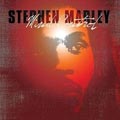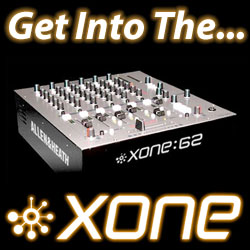|

CD Spotlight


|

Stephen Marley has finally come out of the shadows of his famous father and charismatic older brother Ziggy to deliver an intimate,
yet widely accessible solo effort Mind Control on the Tuff Gong imprint. Combining Dance Hall, Reggae, and his own electronic
take on hip-hop, Marley points his listeners to the future, without forgetting his past. From the instantly catcy Traffic Jam featuring his
half-brother Damian (Jr. Gong), to the delicate Lonely Avenue in which you'll need a voiceprint to differentiate him from his father's trippy best,
Stephen Marley is a force to be reckoned with. This could be the best Marley offspring album to date. Buy it now!
LISTEN!
|

Digital Spotlight


|

Gabriel Ananda is set to release his full-length, Bambusbeats on March 19th. The new release has a mature sound, but falls away from his well-known melodic style to venture into new territories. To celebrate the release his label is graciously giving away one of the album's best cuts, Lamakov as a free download. This artistic minimal journey builds to a nice crescendo before melting in your mouth and then your pants...
LISTEN!
|

Vinyl Spotlight


|

Paul Van Dyk's Vandit Imprint drops Lange Vs. Gareth Emery's Another You, Another Me. a Funky Trance release with a nice throbbing percussive tech house remix by Terranova & Austin Leeds.
LISTEN!
|


|


|
|
|
|
April 9, 2006
../ Music Trends: Rap Industry Takes A Hard Look At Itself
21% Sales Decline Spurs Self-Examination
After 30 years of growing popularity, Rap music has finally hit its tipping point.
Though music sales are down overall, Rap sales have declined 21 percent from 2005 to 2006, and for the first time in 12 years, no Hip-Hop album was among
the top 10 sellers of the year. Many have forecasted the death of Hip-Hop over the years, but it appears that the umpteenth drug-dealing anthem,
chest-pounding boast, gun-play recount or soft-core, booty-bouncing music video, has, finally, gotten stale.


Hip-Hop Is Dead, the recent album from Nas says it all
In addition, many within the Rap industry are finally coming to the realization that the genre has had a serious negative effect on society,
and the perception of African-Americans living in the United States. Hip-Hop also seems to be increasingly blamed for a variety of social ills.
Studies have attempted to link it to everything from teen drug use to increased sexual activity among young girls. However, one thing is certain,
it doesn't promote positive values. Due to the negativity, a backlash has occurred that is now reverberating thoughout the industry.
The truth is that most Rap buyers are white, middle-class youth, and today
the genre has been wholeheartedly embraced as Pop music. However, the African-American community could be facing the repercussions of a genre
whose negative attitudes and images being adopted by black youth. Throughout its history, Rap has been critized by outsiders who were shocked
by the music's pessimistic messages, ghetto warfare, misogynous postures and racial polarization. But now these criticisms are being lobbed by
the artists, industry insiders and producers.
Why The Sudden Change Within The Community?
One reason is that Rap's early adopters, and most ardent original defenders,
are now older and more mature. With an advanced perspective on Rap music and its adverse influence on their generation, the internal criticism
is increasing. Additionally, many members of the African-American community who were outspoken about the negative stereotypes and mistreatment
of women, but dismissed as alarmist, are finally getting their due.
Activist C. Dolores Tucker whose crusade against the glorification of the
criminal lifestyle, lyrical content that was degrading to women and other detriments to the perception of the typical African-American went
largely unheard during the 1990's, now can be looked upon as a pioneer and not a conservatist.
This is not to say there haven't been Rappers who sport a positive message and
outlook. But those albums rarely sold. Arrested Development, KRS-One, Public Enemy and Lauryn Hill come to mind, but their conscious messages have
sadly been ignored by the industry and the fans.


Combining Dance Hall, Reggae, and his own electronic take on hip-hop, Marley's conscious Mind Control could be just what the industry needs
It will only take one artist to change the way people feel about Rap and Hip-Hop
by putting together a forward thinking album that can actually sell records. One such artist is Stephen Marley, our CD Spotlight pick for April.
The youngest son of Bob and Rita Marley, Stephen has recently released
Mind Control, a
melting-pot that showcases a variety of styles including Reggae, Rock, R&B, Flamenco and Hip-Hop. Marley proves that his progressive beats can be
instantly catchy, and danceable, without resorting to the saber-rattling cliches that dominate Rap's cookie-cutter releases.
The Future: Can the Rap industry reinvent itself without being
buried by its own weight? Certainly. Rap's producers and artists are some of the most ingenious working in the industry today. The real question
is will they take the risk? Once you're looked upon as "soft" in Hip-Hop, your career is essentially over. So it will take a respected
pioneer like Dr. Dre, or Timbaland to make the shift.
>>> Back To Digihear?

Advertise on Futuremusic.com! | Privacy Policy |
Employment Opportunities | Contact Us
Copyright © 2007 Futuremusic® All Rights Reserved.

|

|
|


TestDrive will feature the lab results of our Audio Experiments so that everyone can get in on the action. Take the latest electronic music releases, mix vigorously
with bleeding-edge music production technology in a large beeker, and then cook the hell out of it!
Check out our latest review: Slappa CD Cases.


News Archives

Digihear? Stories: March 2007
Digihear? Stories: February 2007
Digihear? Stories: January 2007
Digihear? Stories: December 2006
Digihear? Stories: November 2006
Digihear? Stories: October 2006
Digihear? Stories: September 2006
Digihear? Stories: August 2006
Digihear? Stories: July 2006
Digihear? Stories: June 2006
Digihear? Stories: May 2006
Digihear? Stories: April 2006




|
|











